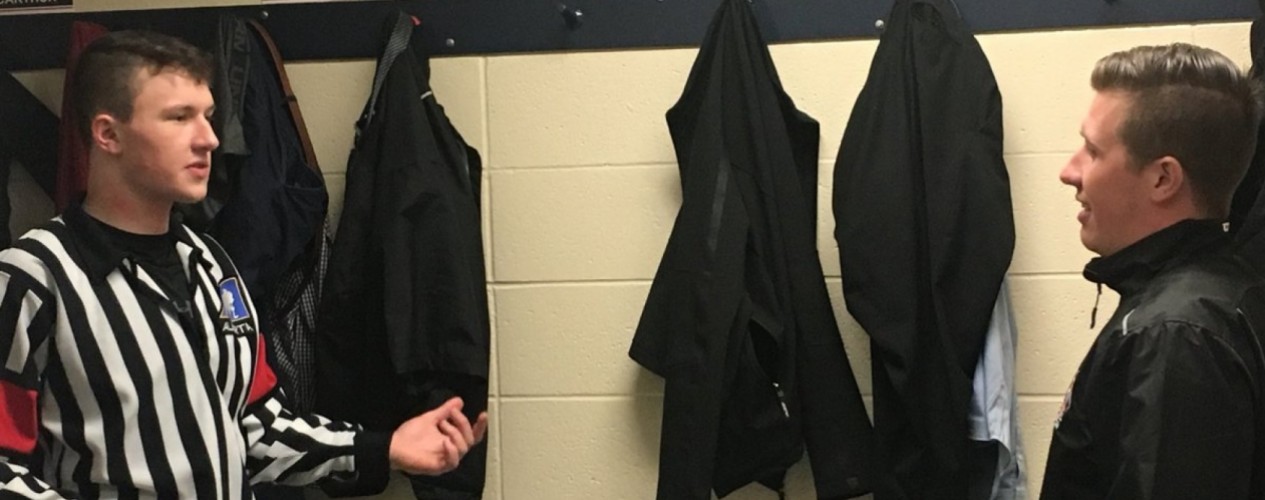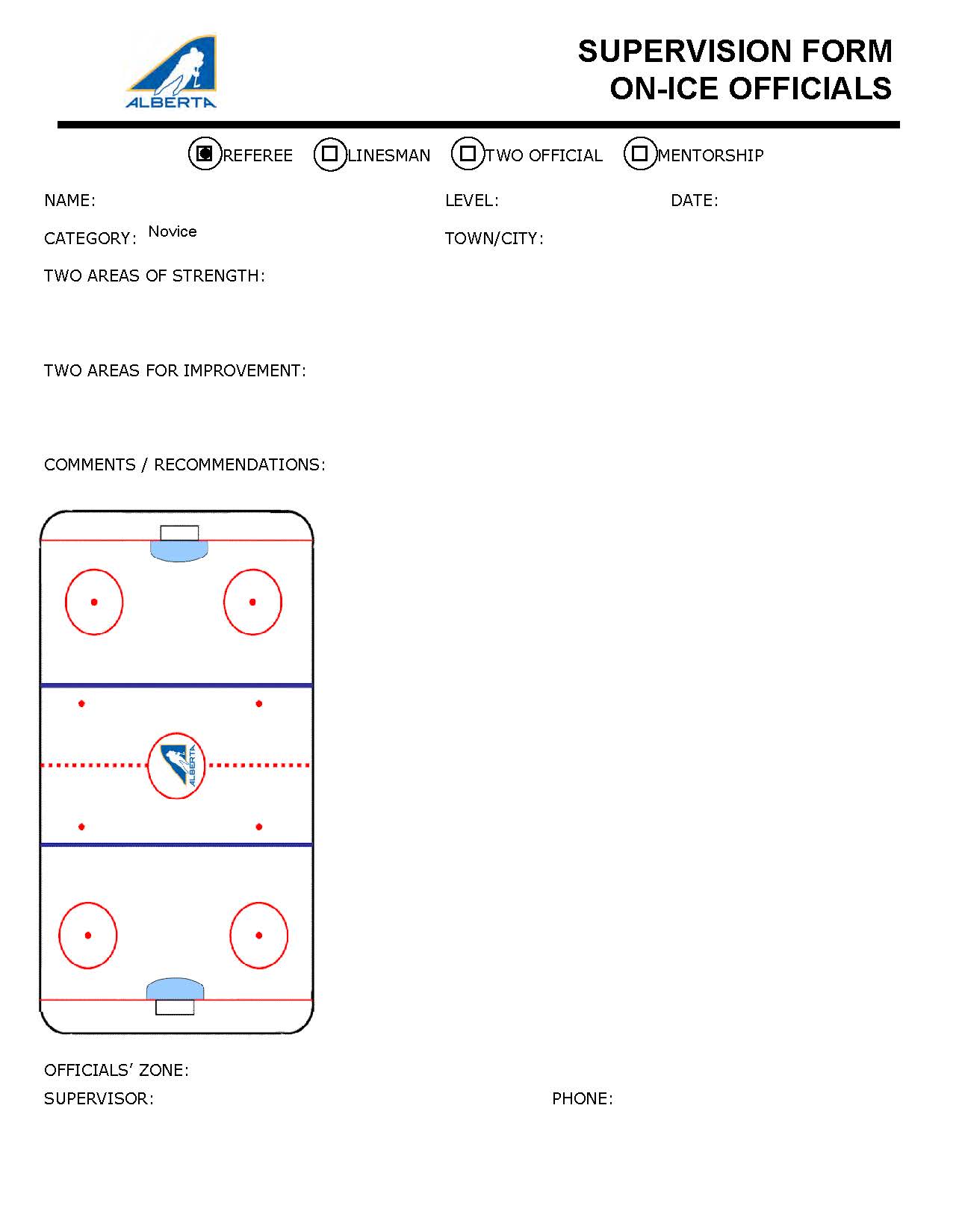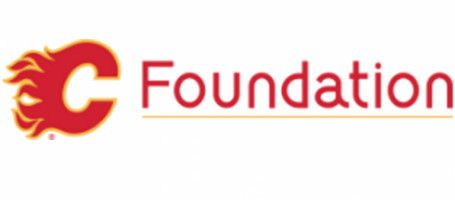Supervisions
The Supervision Program is a support program designed to achieve two main goals – improve the quality of officials, identify skilled officials throughout the province, and ensure a uniform application of the rules. Good supervisions are positive and honest, and they rate officials relative to the level of hockey they are working.
Role of the Supervisor
- Coach: Give them the necessary information to maximize their skills
- Help: Encourage, answer questions, be open and available
- Know the Rules and Procedures: You need to be a source of this information. Reinforce class room instruction in real games.
- Communicate: Good open communication is the key to a good supervision. Be a good listener. Be empathetic.
- Problem Solve: Identify problems and provide solutions. Provide a couple of areas to work on. Provide positive reinforcement.
- Evaluate: The supervisions are used to determine the level of the official’s skill development.
- Technical Assistance: Skating, positioning, signals, procedures, communication
- Judgement/Game Management: Standard of Enforcement, Consistency, Handling of game situations
- Have a Positive Attitude
- Be Honest and Sincere
- Be a Buffer with Leagues if necessary
Supervision Form (PDF version)
U9 and U11
This level of hockey is done using the two-man system of officiating. The key points to look for are listed below:
- Positioning and puck drop procedures in each zone
- Back official’s duties in neutral zone
- Proper position on center-ice face-offs after goal is scored
- Good communication on the ice before, during and after game.
U13
This level of hockey is done using the three-man system of officiating. The key points to look for in the referee are listed below:
- Rapport and communication with linesman, players and coaches. Does he have the respect of the players and coaches?
- End-zone positioning. Use of home base, half-piston and at the net positions.
- Positioning following the play out of the zone and into the zone.
- Is the penalty procedure correct? Stop after blowing whistle, pause, then point to player and give signal. Does he skate backwards towards the penalty box to keep an eye on players and avoid contact with penalized player?
The key points to watch in the linesman are as follows:
- Positioning at the blue line to make to close call.
- Positioning as the back linesman in the neutral zone to be able to move with play as it changes zones or stops in his partner’s zone and to be able to call offside passes.
- Judgment on icing calls.
- Face-off procedure:
- Are centers and the wingers in front lined up correctly?
- Have the wingers behind been checked to ensure that they are not encroaching?
- Does the back linesman watch the wingers behind his partner to ensure they are not moving or entering the face-off circle before the puck is dropped?
U15 and U18
The key points to look for in the Referee are listed below:
- Rapport and communication with linesman, players and coaches. Does he have the respect of the players and coaches?
- End-zone positioning. Use of home base, half-piston and at the net positions.
- Positioning following the play out of the zone and into the zone.
- Is the penalty procedure correct? Stop after blowing whistle, pause, then point to player and give signal. Does he skate backwards towards the penalty box to keep an eye on players and avoid contact with penalized player?
- Judgment and consistency with regards to penalty selection. Does the referee stay focused and concentrate for the complete game or are there times when it was apparent that his concentration lapsed?
- Reaction to pressure – fans, coaches, players complaining about calls made or not made. Is the referee able to concentrate through all the noise and distraction?
The key points to watch in the linesman are as follows:
- Positioning at the blue line to make to close call.
- Positioning as the back linesman in the neutral zone to be able to move with play as it changes zones or stops in his partner’s zone and to be able to call offside passes.
- Judgment on icing calls.
- Face-off procedure:
- Are centres and the wingers in front lined up correctly?
- Have the wingers behind been checked to ensure that they are not encroaching?
- Does the back linesman watch the wingers behind his partner to ensure they are not moving or entering the face-off circle before the puck is dropped?
- Are both linesmen ejecting the centers from the face-off if an encroachment violation occurs when it is their responsibility?
- Is the puck drop consistent and fair to both centers?
- Do the linesmen exit the zone after a face-off quickly, backing towards the blueline to watch play and avoid players or the puck?
- Do the linesmen release their partners when returning to their position at the
blue line? - When covering for the referee, are the linesmen moving to the proper position for a play at the net?
- If a goal is scored, are the linesmen pointing at the net without blowing the whistle?
- Are the linesmen releasing to their blue line with the referee gaining correct position? - Are proper procedures being followed?
- Check nets before the game starts.
- Awareness/communication after whistles, during fights.
- Repairing holes in ice.
- Picking up broken sticks, lost equipment.
- Escorting players to penalty box to avoid any other confrontation
-
Honesty is the best policy. Always be honest in your comments; do not tell the officials one thing and then report something different.
-
Always be objective in your comments. If there is something critical to report, then offer a method or solution with which the official may correct or improve.
-
Be a good listener. It is important that you be attentive to what an official is saying to ensure that there is no misunderstanding of your comments.
-
Be sympathetic, especially when dealing with inexperienced officials. Remember, you were once a “rookie” yourself.
-
When talking to the referee, it is usually acceptable to have the linesmen listen in, as this can be a learning opportunity for them as well. If the discussion may be very critical, you may want to discuss these issues only with the referee.
-
Talk to both linesmen in the presence of the referee. This encourages teamwork, and provides the opportunity for input from all officials.
-
Talk to both officials at the same time if the game was officiated using the two-official system.
-
Never be openly critical of game officials or the association that you represent. Hockey fans and players are quick to believe the negative instead of the positive things about a referee or linesman.
-
Make your report and comments private. Your report is confidential and must be treated as such.
-
Be beyond reproach at all times in your actions and comments. Remember, good communication is the lifeline between officials and the supervisor.
1. BE OPEN MINDED AND OPEN IN YOUR COMMUNICATION.
- Improvement as a result of supervision depends on good communication. Try to avoid roadblocks and be open and honest in the discussion.
- "What did you see" means tell me what you saw, not why you did something. If the Supervisor asks this question it likely means s/he did not see the play or s/he wants to know why you handled it a certain way and needs to be sure that you both are at the same starting point for that discussion.
- Don’t be afraid to present your opinion and reasons if you disagree. Be willing to discuss this issue but consider that the Supervisor should be correct in what he/she tells you.
2. PAY ATTENTION TO WHAT IS BEING SAID.
- Not everything s/he says will help you but evaluate it and how it applies to you. In order to do this you need to listen attentively.
- Don’t be changing during the discussion, this could pre-occupy you and you could lose your concentration.
3. ACCEPT MISTAKES.
- If there are points to be corrected, accept it. Don’t try to make excuses or blame others.
4. DEALING WITH CONFLICTING MESSAGES.
- If there is a different message from different Supervisors point that out and discuss it. Expect to get a clarification call from one of the Supervisors.
5. DON’T INTERRUPT WHEN THE SUPERVISOR IS TALKING TO ANOTHER OFFICIAL
- You will get your turn to talk to the Supervisor.
- The Supervisor will include you if s/he needs your input in that conversation.
6. AVOID MAKING THE SAME MISTAKES YOU WERE TOLD ABOUT PREVIOUSLY.
- It is very frustrating for a Supervisor to be repeating the same things with no sign of improvement. This tells the Supervisor that s/he is wasting time with you. The Supervisor may judge this as a negative attitude.
Can I supervise officials officiating levels of hockey that are higher than I officiate? We recommend that you don’t. A good rule of thumb is to supervise the levels of hockey that you are currently working and below. We encourage that you try to watch and learn from officials working the higher levels of hockey and then ask questions if you see them doing something you are unfamiliar with.
I have never filled out a supervision form before, is it difficult? The forms are straightforward. You are looking for 2 areas of strength of the official that you are watching has. Then you are looking for 2 areas of improvement that you believe the official you are watching can work on. Feel free to make notes and include any comments. Then after the game when you deliver your supervision you can explain the comments to the official.
When should I give the supervision to the official I have watched? We recommend that you deliver the supervision after the game. In between periods is a great time for the officials to talk amongst themselves and also to rest. If we have supervisors delivering their supervisions between periods it takes away from both crew dialogue and a rest period.
What happens if i really don’t agree with the supervision that i have been given? If you disagree with what the supervisor has said, please contact your Regional Supervisions Coordinator. Do not get into an argument with a supervisor or give him the impression that you don’t care what s/he says.
Should I be scared to supervise officials that are older than me? No. Older officials appreciate when younger officials come out and give them a supervision during their games.
I have never been supervised and i would love to have someone watch me work a game. How can i make this happen? Due to the vast number of officials that are registered each year this is a common problem that we unfortunately face. Contact your Regional Supervisions Coordinator, and s/he will work to get somebody to the rink to watch you officiate as soon as possible.
Should I introduce myself before the game and let the officials know that I will be supervising them?
Yes. We recommend that you do this as it eliminates the surprise element after game.
I had a supervisor email me my supervision last year, is this appropriate?
Yes. The official form is the PDF version available on the Hockey Alberta Officials website. Take notes during the game on a notepad, use these notes when you are discussing your supervision with the official after the game, and then when you get home, transfer your notes to the supervision form and then email a copy of the supervision to the official and Regional Supervision Coordinator.



